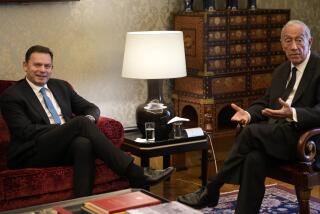Portugal Remains a Have-Not Nation
- Share via
LISBON — At November’s NATO summit in Prague, after each head of government had delivered a brief speech, an embarrassing oversight was discovered: They’d forgotten Portugal.
Prime Minister Jose Manuel Durao Barroso took the gaffe in good spirits and got to make his speech, but many Portuguese were reminded of a warning that Durao himself had delivered when he took office this year: “Portugal is in danger of becoming irrelevant.”
Indeed, from a maritime power whose empire once stretched from Brazil through Africa to the Far East, Portugal feels shrunken and laggardly today -- an Indiana-sized country of 10 million people on Europe’s southwest fringe, still struggling to shake off unwanted superlatives: lowest average monthly wage in the European Union, lowest level of education, lowest industrial productivity.
As Europe marches forward with its ambition of becoming a world power with a united foreign policy and currency, have-nots like Portugal are a reminder of how distant the dream of parity among member nations remains.
Much was supposed to change for Portugal when it joined the new, prosperous European bloc in 1986 and, for the next 15 years or so, things went well. More than $26 billion in European aid poured in, building highways, bridges and airports.
The overall standard of living has improved from 56% of the European average in 1986 to 74% today. Open borders have brought the soft, beguiling sound of Portuguese to every corner of the Continent. Car and phone ownership has soared, as has new home construction. Lisbon, the graceful 850-year-old capital, has the glass-paned office buildings, fashionable stores and modern airport of any European city.
“These days, a teenager in Portugal is virtually indistinguishable from one in Spain or France,” said Enrique Santos, president of the Portuguese-Spanish Chamber of Commerce.
But now there’s a pervasive feeling that the party is over.
The European Union is about to expand from 15 member states to 25, some of them big and more in need of European money, such as Poland.
That inevitably means less for Portugal, especially if the union meets its deadline of 2006 for putting a lid on farm subsidies.
In Portugal’s race to catch up with the rest of Europe, “we’re blowing our chance,” said Joao Pedroto, a partner in a Lisbon tourism company. “We’ve got to change our attitude and start putting some hard work in.”
Easier said than done.
Durao recently proposed ending the practice of four-day weekends whenever a public holiday falls on a Thursday or Tuesday. He might as well have tried banning grilled sardines and sangria on lazy summer evenings.
The welfare system is decrepit, labor practices outmoded. In the countryside, donkeys and mules can still be seen doing the hard work instead of tractors. The average monthly wage of about $740 is just a third of Germany’s.
“Most of the EU is made up of wealthy countries with pockets of poverty. Portugal is a poor country with pockets of wealth,” said Antonio Barreto, a Lisbon university sociologist.
Michael Porter, a Harvard Business School professor contracted by the government in 1994 to map out a future for the fragile Portuguese economy, recently returned to judge how the project had worked out.
His gloomy assessment: “Portugal has wasted the past eight years.”
Like many European nations, Portugal is not entirely sold on blending itself into the European Union. It joined the bloc’s single currency, shedding the escudo for the euro.
But small details can sometimes make a big point.
When the Lisbon Stock Exchange joined Euronext, the pan-European share market, the head of the Portuguese exchange instructed Portuguese publications to use its new official name, Euronext Lisbon.
Most insisted on sticking with the Portuguese spelling, Lisboa.
The editors were not just being finicky: They were shaking their fists at a perceived disregard for their country -- the sort of attitude that led to their prime minister’s embarrassment at the NATO summit.
“It’s a kind of national protest, an insistence on being Portuguese,” said Carlos Romero, economics editor at the daily Publico.
Portugal’s Europeanness often feels only skin-deep.
“We’re still much closer, in the way we are, to Africa and Latin America than to Germany, for instance, or the Nordic countries,” said Clara Ferreira Alves, a writer and columnist.
Most emotional bad-mouthing is aimed at neighboring Spain, the world’s 10th-largest economy and a traditional rival. Unleashed by the trading privileges of EU membership, Spanish corporations are devouring chunks of the Portuguese economy, especially in banking, telecommunications and retailing. Spain’s investment in Portugal has quadrupled in a decade to more than $1 billion.
A new Lisbon landmark, the giant Spanish department store Corte Ingles, is a potent reminder of the next-door neighbor, five times bigger and four times more populous. The store, whose name, ironically, means “English Court,” has already irked Lisbonites by issuing tickets for its 14-screen cinema complex in Spanish.
The suspicion of Spanish domination resonates in a nation that Spain tried to annex in the 12th, 17th and 19th centuries. This year, the June 10 Movement, named after Portugal’s national day, alerted President Jorge Sampaio to what it called a new Spanish attempt to “absorb” Portugal.
“It’s happened before, and we have to stop it happening again,” Lt. Col. Brandao Ferreira, a retired Air Force officer who belongs to the group, said in an interview.
“God is a Spaniard,” Portuguese farmers moan over a ruined crop. Portuguese ridicule Spanish cuisine. Spanish make unkind jokes about Portuguese women having mustaches.
In this struggle with what they see as a globalized dog-eat-dog world, the Portuguese tend to write themselves off, believing that their brandos costumes, or gentle ways, make them too accommodating for their own good.
Portugal turned a corner when a 41-year dictatorship ended in a 1974 military coup that ushered in the vibrant democracy of today and dismantled the last remnants of overseas empire. An incident during that coup, captured in grainy, black-and-white television footage, is seen by some Portuguese as a commentary on their obliging character.
A soldier representing mutinous troops walks across a field to a garrison of soldiers loyal to the dictatorship. Surrounded by supportive townsfolk, he begs the loyalists to join his men.
“No, really, I can’t,” says the loyalist’s commander. “My boss will be furious.”
They argue for a while, about politics, democracy and empire, until the loyalist scratches his head, grumbles that he’ll probably get into big trouble and yields (“All right, then”) to cheers.
More to Read
Sign up for Essential California
The most important California stories and recommendations in your inbox every morning.
You may occasionally receive promotional content from the Los Angeles Times.













